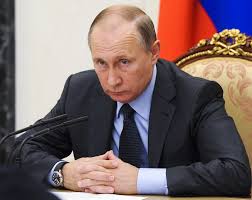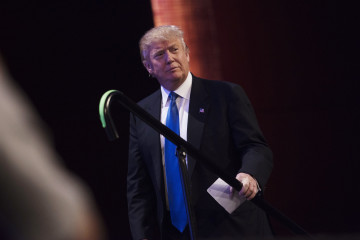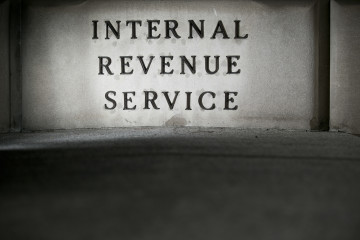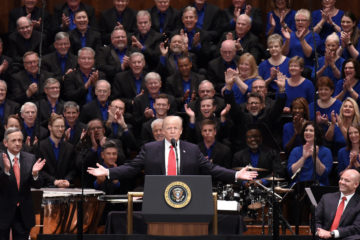Russians Drop Texas Oil Bid, Averting Trump Security Review

(Bloomberg) —Only 16 months ago, the Russian billionaire Mikhail Fridman and his business partners happily sank $200 million into Uber.
But now Fridman’s investment company, LetterOne, has pulled out of an even bigger U.S. investment to avoid resistance from an unexpected corner — the Trump administration. LetterOne’s L1 Energy unit recently walked away from a deal to buy Texas oil producer ExL Petroleum Management LLC for about $700 million over concerns the plan could be rebuffed by the Committee on Foreign Investment in the U.S., or CFIUS, the government panel that reviews deals for national security risks.
Fridman’s LetterOne says it will buy European health-food retailer
“We consciously decided to postpone our investments in the U.S. oil sector,” Fridman told Bloomberg. “Many investors are finding the process challenging. Right now it’s overshadowed by this whole political cloud. It’s narrowing our ability to invest in the U.S. for the near future.”
Fridman’s flagship company, Moscow-based Alfa Group, has spent months vociferously denying that it has any ties to President Donald Trump, his family business or his campaign. Alfa Bank has denied allegations in news reports of possible electronic communications between a server at the bank and one identified with the Trump Organization during the 2016 U.S. presidential campaign. And in January, after Buzzfeed published an intelligence dossier alleging in part that Alfa Bank was part of a Russian scheme to influence the 2016 election, Fridman and his partners sued the site for defamation.
“We are an innocent victim of this whole story,” Fridman said about the server reports. “We’d like to find out who was behind it, who framed it.”
Billions to Invest
Though L1 said the allegations weren’t a factor in the scuttled deal, the reports have undermined years of effort by Fridman and his partners to distance themselves from Russia, hiring western advisers and setting up a London office to invest billions of dollars through LetterOne. They’ve even brought in former BP Plc Chief Executive Officer John Browne to run the Luxembourg-based energy unit of L1.
L1 had a tentative agreement to pay about $700 million to buy Midland, Texas-based ExL, which operates in the massive Permian Basin, from Houston-based buyout firm Quantum Energy Partners, said the people familiar with the matter. ExL began working with advisers last year to explore a sale and now plans to solicit other offers, they said.
Quantum didn’t respond to requests for comment. ExL declined to comment.
The oil field that L1 wanted to buy was close to a U.S. air base, complicating matters, according to Stuart Bruseth, an L1 spokesman. “No CFIUS-related officials even mentioned the false allegations of communication between the Trump Organization and Alfa Bank,” Bruseth said.
Fridman said L1 has around $22 billion in net assets, including $9.3 billion in cash, that it wants to deploy. But the company decided to postpone “billions of dollars” of deals in the U.S. energy sector, he said.
While he’s hit the pause button on some U.S. investments because of the political situation, Fridman is pushing ahead with deals in Europe. Today he announced an agreement to buy Holland & Barrett, one of Europe’s largest health-food retailers, from Carlyle Group LP for 1.8 billion pounds ($2.3 billion).
‘More Excruciating’
CFIUS, now headed by Treasury Secretary Steven Mnuchin, can’t stop deals on its own. It can only recommend that the president block them on national security grounds. Still, when faced with what they may consider insurmountable concerns from the panel, companies often terminate their deals rather than be branded a security risk.
The panel’s work is confidential and it doesn’t comment on it. Last week, Senate Majority Whip John Cornyn of Texas said he’s drafting a bill to strengthen CFIUS’s risk assessment of companies from nations that are deemed the biggest threats to the U.S. — China, which has been a focus of reviews in recent years, and Russia.
Attorneys who specialize in CFIUS filings say the agency has started asking their clients a lot more questions during reviews under the Trump administration, according to Stephen Paul Mahinka, a lawyer at Morgan Lewis in Washington.
“You have to undergo a more detailed review process from countries like China and Russia today than before, and that’s because there is such political focus,” Mahinka said. “There are a lot more questions. It’s become more excruciating.”
Cash From Russia Sale
Fridman, Russia’s fifth-richest individual, co-founded LetterOne in 2013 to invest the $14 billion that went to his group from the $55 billion sale of their oil venture with BP to Kremlin-controlled Rosneft PJSC. His Alfa Bank co-founder, Petr Aven, was Russia’s minister for foreign economic relations in 1991 and 1992, when President Vladimir Putin held a similar position at the city level in St. Petersburg.
LetterOne has faced hurdles before in its westward expansion. In 2014 — after L1 Energy agreed to pay 5.1 billion euros ($5.5 billion) to RWE AG for oil and gas units in Germany, Britain, Norway and Egypt — the U.K. forced the Russians to sell some assets because of concerns that future sanctions against Russia over the conflict in Ukraine could jeopardize North Sea oil supplies. (Fridman, Aven and the other partners aren’t subject to U.S. or EU sanctions.)
L1 Energy has been seeking to expand in the U.S. since buying EON SE’s North Sea oil and gas assets in late 2015 for about $1.6 billion. Scott Sheffield, the former CEO of Pioneer Natural Resources Co., one of the biggest operators in the Permian Basin, joined L1’s advisory board this year.
LetterOne secured CFIUS approval for a deal as recently as last August, when it invested $50 million into FreedomPop, a Los Angeles-based company it describes as a provider of “disruptive mobile services.” The investment in San Francisco-based Uber Technologies Inc. didn’t require the panel’s approval.
Along the way, the partners have used their wealth to deepen ties between the West and Russia. The Alfa Fellowship Program sends up to 18 U.S., U.K. and German citizens to Russia every year for work, and the annual Genesis prize awards $1 million to individuals committed to Jewish values. In 2015, the Kennan Institute at the Wilson Center in Washington honored Aven for his corporate and public service.
Cyber Probes
More recently, they’ve hired computer experts to try to clear their names. Last year, Alfa hired Mandiant, the cyber-forensics division of FireEye Inc., to investigate its computer systems about the potential contact between a Trump-affiliated server and the bank’s servers. Alfa Bank has said the investigation showed no evidence of communication between the Trump Organization and Alfa Bank. Mandiant said in November that the information it had was “inconclusive and is not evidence of substantive contact or a direct email or financial link between Alfa Bank and the Trump campaign or organization.”
The FBI looked into the computer connection late last year, questioning Cendyn, which operated the Trump email domain that Alfa’s servers repeatedly contacted during the campaign, said Michael Bennett, a Cendyn spokesman. “We’ve fully cooperated with the FBI and any requests they have made,” he said.
Representatives of the FBI and Justice Department declined to comment.
In March, Alfa said it had been the victim of cyberattacks designed to make it look as though it had a secret channel to Trump. The bank said it asked the Justice Department for help and hired a U.S. forensics firm, Stroz Friedberg, to investigate.
Alfa Bank, in a statement, said the most recent findings have been shared with FBI investigators in Chicago, who it said are “looking into whether there is any criminal wrongdoing behind these cyberattacks against Alfa Bank.”
–With assistance from Elizabeth Fournier, David McLaughlin, Michael Riley and Irina Reznik.To contact the reporters on this story: Stephanie Baker in London at stebaker@bloomberg.net ;Matthew Monks in New York at mmonks1@bloomberg.net To contact the editors responsible for this story: David Gillen at dgillen3@bloomberg.net Brad Cook, Jeffrey D Grocott







No Comment